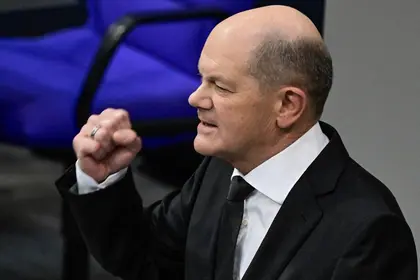German Chancellor Olaf Scholz vowed Wednesday to rally European partners to cobble together support for Ukraine "so huge" that it would weigh on Russian President Vladimir Putin's calculations.
The pledge by the German leader, once criticised for dragging his feet on arming Kyiv, came with fears growing that support from Ukraine's biggest weapons supplier, the United States, could fall away.
JOIN US ON TELEGRAM
Follow our coverage of the war on the @Kyivpost_official.
"We will do everything to ensure that the joint contribution from Europe is so huge that Ukraine can build on it and that Putin would not be able to count on our support waning at some point," he told the German parliament ahead of an EU summit aimed at shoring up military support for Kyiv.
In recent weeks, Scholz had ramped up calls for other EU nations to dig deeper for Ukraine.
The EU's foreign policy chief Josep Borrell admitted Wednesday that the EU will supply Ukraine with just over half of the one million artillery shells it promised to send by March.
In a letter published Wednesday in the Financial Times, Scholz, along with four other European leaders, said despite the failure that "we can't just give up on our promise".
"We must renew our resolve and redouble our efforts in order to ensure that we sustain our support for as long as it takes," wrote Scholz, Denmark's Mette Frederiksen, the Czech Republic's Petr Fiala, Estonia's Kaja Kallas and the Netherlands' Mark Rutte.
- 'Life and death' -

What if Russia Wins?
As orders placed now would only be delivered next year, the leaders underlined that it was crucial to find ways to accelerate the supplies of promised artillery rounds -- through donation of existing stocks or joint procurement.
"The burden is so great that all states need to do everything they can to support Ukraine -- it must continue to be a collective effort," they wrote, underlining that it was a "question of life and death" for Ukrainian soldiers.
The call dovetailed with Borrell's demand on Wednesday for each of the 27 nations to lay out a detailed picture of the military support they are providing to Kyiv.
Accusations have been levelled that key EU economies such as France, Italy and Spain are not pulling their weight on arming Ukraine.
Ukrainian President Volodymyr Zelensky said Germany must use its economic clout to push others to chip in.
"Germany can manage to consolidate the EU," he said in an interview with public broadcaster ARD on Sunday.
"Many countries have important economic relationships with Germany and their economy is dependent on Germany's decisions because Germany has a strong economy," he said.
Germany has become Ukraine's second biggest armaments supplier after a sputtering start. Much of its contributions like Leopard tanks had been made only after public haranguing from other allies.
Even now, Scholz comes under fire for refusing to provide the long-range Taurus missiles sought by Kyiv.
Yet Zelensky, asked if he was disappointed with Scholz over the refusal, hinted that the picture was more complex than that.
"It's not just about Olaf -- it concerns European leaders and the US," he said, adding that he could not say more.
- 'Hubris' -
Some 50 billion euros ($54 billion) of funding for Ukraine was at stake at Thursday's summit in Brussels, and Hungary has so far blocked the package.
The urgency for EU allies to step up for Kyiv has grown as assistance from the US is held up by domestic political squabbles.
President Joe Biden has made backing Ukraine a priority and US weapons and financial assistance have been crucial in helping the pro-Western country battle against a far larger attacking Russian force.
But Republicans have led a push to halt the effort, refusing to authorise new budget outlays unless Biden's Democrats first agree to sweeping new measures against illegal migration.
With the United States in an election year that could again pit Biden against Donald Trump, Zelensky has warned that a Trump return to the White House would likely bring a "different policy" on the war.
For Scholz, it "would be hubris" to imagine that Germany could shoulder the weight alone without the United States.
"We are only a middle-sized power," he said.
You can also highlight the text and press Ctrl + Enter






